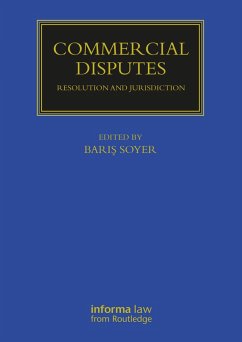
International Negotiable Instruments (eBook, PDF)
Versandkostenfrei!
Sofort per Download lieferbar
101,95 €
inkl. MwSt.
Weitere Ausgaben:

PAYBACK Punkte
51 °P sammeln!
For centuries, bills of exchange, cheques, and promissory notes ('negotiable instruments') have played a vital role in the smooth operation of domestic and international commerce. The payment mechanisms have been subject to rapid technological progress and law has needed to adapt and respond to ensure that the legal framework remains relevant and effective. This book provides a comprehensive and thorough analysis of the question of applicable law to negotiable instruments. Given significant differences in the treatment of important issues under the laws governing negotiable instruments of the ...
For centuries, bills of exchange, cheques, and promissory notes ('negotiable instruments') have played a vital role in the smooth operation of domestic and international commerce. The payment mechanisms have been subject to rapid technological progress and law has needed to adapt and respond to ensure that the legal framework remains relevant and effective. This book provides a comprehensive and thorough analysis of the question of applicable law to negotiable instruments. Given significant differences in the treatment of important issues under the laws governing negotiable instruments of the various jurisdictions, the question of applicable law plays a key role in contemporary commerce. Resolution of such issues frequently has cross-border dimensions, affecting residents from different countries, and meeting the needs of commerce as it rapidly moves towards an online mode of communication and documentation. To such ends, the book elaborates on the conceptual underpinnings of negotiable instruments law, provides an overview of the key differences between the systems in this area of law and contemplates the question of applicable law. The book provides a systematic inquiry into the relevant principles of law, statutes, and international conventions, and analyses the underlying rationale for both applicable and negotiable instruments laws' rules. In this way, it aims to identify and resolve some of the existing uncertainties in the case law and literature with respect to one of the central aspects of commerce. Specifically, the authors challenge the conventional view according to which the fundamentals of negotiable instruments law are excluded from the scope and insights of general contract and property law doctrines and as such not subject to the general conflict of laws rules governing them. The authors make concrete suggestions for reform and contemplate on the nature of the legal rules that can also be applied in the digital age of communication.
Dieser Download kann aus rechtlichen Gründen nur mit Rechnungsadresse in A, B, BG, CY, CZ, D, DK, EW, E, FIN, F, GR, HR, H, IRL, I, LT, L, LR, M, NL, PL, P, R, S, SLO, SK ausgeliefert werden.













